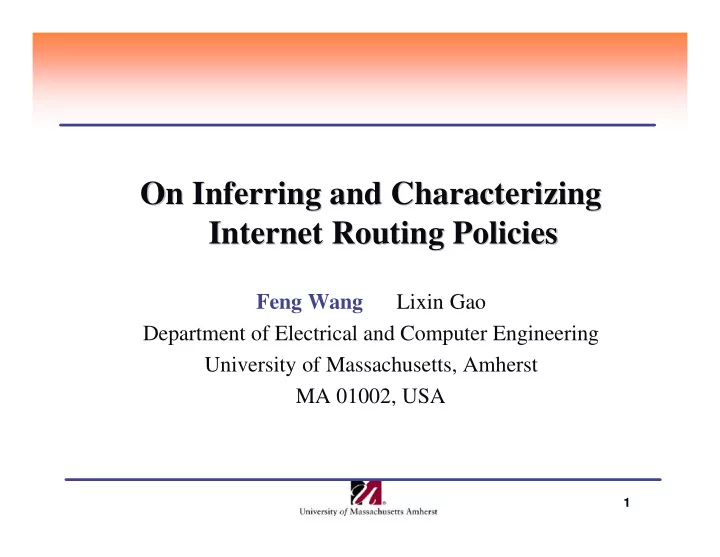

On Inferring and Characterizing On Inferring and Characterizing Internet Routing Policies Internet Routing Policies Feng Wang Lixin Gao Department of Electrical and Computer Engineering University of Massachusetts, Amherst MA 01002, USA 1
Introduction Introduction • The Internet connects thousands of Autonomous Systems (ASs) . • Border Gateway Protocol (BGP): an inter-domain routing protocol • Routing policies – Import policy – Export policy 2
AS Relationships AS Relationships • Reflecting the commercial agreement among ASs Provider-to-customer and Peer-to-peer AS1 AS2 AS4 AS3 Provider-to-customer Peer-to-peer AS5 AS6 3
Motivation Motivation • Reachability is determined not only by connectivity but also routing policies. • Little is known about routing policies network operators employed. • Global view of routing policies is useful – Robustness of the Internet. – Performing traffic engineering effectively. • Our work : –Inferring and characterizing import policies. –Inferring and characterizing export policies. 4
Inferring Routing Policies Inferring Routing Policies • Import policies : – Local preference, MED, BGP community. • Export policies : – Permit or deny a route, assign MED, tag BGP community.. 5
Data Sources Data Sources • Routing tables from Oregon RouteView on Nov. 11, 2002, and 15 ASs’ Looking Glass servers (including 3 Tier-1 ASs, 2 Tier-2 ASs) on Nov. 11, 2002. – 42 ASs are in North America – 33 ASs are in Europe – 3 ASs are in Australia – 2 ASs are in Asia • AS relationships – Inferred from Gao’s algorithm 6
Inferring Import Routing Policies Inferring Import Routing Policies •Consistency of local preference with commercial relationships Typical local preference : • – localpref(customer) > localpref(peer) – localpref(peer) > localpref(provider) localpref(customer) > localpref(provider) – • Atypical local preference: – localpref(provider) >= localpref(peer) – localpref(peer) >= localpref(customer) – localpref(provider) >= localpref(customer) •Consistency of local preference with next hop AS 7
Result of Import Policies Result of Import Policies Most ASs employ typical local preference. • ASN Percentage of typical ASN Percentage of typical local local preference preference AS577 94.3 AS2578 99.982 AS5511 96.5 AS513 100 AS3549 99.7 AS6762 100 AS6667 99.94 AS559 100 AS7474 99.955 AS12859 100 AS12359 99.98 AS8262 100 AS7018 99.99 AS6539 100 AS1 99.994 8
Consistency of Local Preference with Next Consistency of Local Preference with Next Hop ASs ASs Hop • Most ASs set local preference values based on next hop ASs preference are based on next hop AS Percentage of prefixes whose local Different ASs 9
Potential Error Introduced by Inferred Potential Error Introduced by Inferred AS Relationships AS Relationships • Using BGP community, we verified 9 ASs’ relationships derived by Gao’s algorithm. • The potential error introduced by inferred AS relationships is small. 10 10
Inferring Exporting Policies to Provider Inferring Exporting Policies to Provider P 1 is announced through the peer path p 1 , p 2 AS1 AS2 AS5 AS4 p 2 p 1 , p 2 Peer-to-peer Provider-to-customer AS3 Prefix p 1 , p 2 • From the view point of AS 1, prefix p 1 is a SA prefix ( selective announced prefix). 11 11
SA Prefixes SA Prefixes • Tier-1 ASs, have a significant number of SA prefixes. ASN Tier % of SA prefixes ASN Tier % of SA prefixes AS1 1 32 AS7018 1 22 AS3549 1 23 AS701 1 27.8 AS6453 1 48.6 AS6461 1 4 AS1239 1 29.4 AS3561 1 5.2 AS2914 1 14 AS209 1 38 AS5511 2 18 AS577 2 17 AS6538 2 11 AS6667 2 13 AS12359 3 0 AS12859 3 0 12 12
Validation of SA Prefixes Validation of SA Prefixes • Validation by email? • Validation by paths used by other prefixes AS1 AS2 Customer path AS5 AS4 AS3 13 13
Persistence of SA Prefixes Persistence of SA Prefixes • For AS1’s, each bar represents a snapshot of BGP routing table. Number of Prefixes Days (during March 2002) 14 14
Possible Causes of SA prefixes Possible Causes of SA prefixes 1) Prefix splitting 2) Prefix aggregating AS1 AS1 12.0.0.0/ 19 / 19 / 20 / 19 AS2 AS2 / 20 / 20 12.0.0.0/ 19 AS3 12.0.0.0/ 20 15 15
Results of Possible Causes Results of Possible Causes • Prefix splitting and prefix aggregating are not the major causes of selective announcement . 16 16
Conclusions Conclusions • Import policy typically obeys preference as follows: – Customer > peer and provider – Peer > provider – Based on next hop ASs • A number of customers selectively announce their prefixes to a subset of upstream providers. – Giving insight on traffic engineering and implication on robustness of the Internet. • Result of exporting policies to peers. 17 17
Questions? Questions? 18 18
Recommend
More recommend